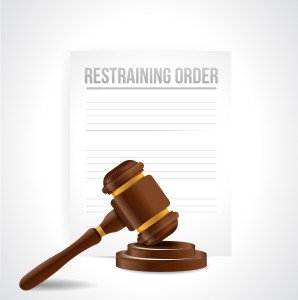
At the final hearing, the plaintiff goes first and has the burden of proof. Because it is a civil case (and not a criminal case), the standard of proof is “by a preponderance of evidence,” which basically means more likely than not. If the plaintiff can show the following three things by more than 50 percent of the weight of credible evidence, then the restraining order will be granted:
- Predicate Act of Domestic Violence
- Prior History of Domestic Violence
- Restraining Order Required to Protect the Victim
The trial is held before and decided by a Judge, not a jury. The plaintiff goes first and seeks to admit any and all evidence they want to show that a predicate act of domestic violence has occurred. If they allege harassment and stalking in the temporary restraining order (TRO), then they must prove harassment and stalking at the trial. Any alleged predicate acts of domestic violence that were not included in the restraining order cannot be alleged at trial. The defendant must have notice of the alleged acts of domestic violence prior to the trial. In addition, the plaintiff should include any prior history of domestic violence in the TRO and must prove those incidents at trial. Some of the evidence that can be used at trial to prove the case include:
- Plaintiff’s testimony
- Witness testimony
- Photos of injuries, damage done, etc.
- Text messages of threats, harassment, etc.
- Voice messages of threats, harassment, etc.
- Emails of threats, harassment, etc.
- Prior police reports that have been filed
- Any hospital or doctor records regarding injuries sustained
After the plaintiff has testified, admitted any evidence he or she wishes to admit, and called any additional witnesses they choose, the plaintiff rests. It is then the defendant’s turn to testify (if they choose), admit any rebuttal evidence they may have (including texts, emails, voicemails, etc.), and call any witnesses they choose. Once the defense rests, then the judge will decide whether or not a permanent (final) restraining order should issue.
If the judge determines that the plaintiff has met the burden of proof and established predicate act(s) of domestic violence and that a restraining order is necessary to protect the plaintiff, then a final restraining order (FRO) is issued. This FRO is permanent and never expires. The defendant is fingerprinted and placed in a statewide database for domestic violence offenders. The defendant can no longer have any contact with the plaintiff and any other individuals who are named in the FRO (i.e. the victim’s parents). The defendant may also be prohibited from the plaintiff’s home, place of employment, etc. All of these details will be spelled out in the final order. Additionally, the defendant will no longer be allowed to own firearms, and any firearms that were seized upon the issuance of the TRO will be forfeited. Moreover, if the defendant is not a US citizen, the issuance of the permanent restraining order could affect their immigration status, as well as their ability to enter and leave the country legally.
If the judge determines that the plaintiff failed to meet the burden of proof for the issuance of the final restraining order (FRO), then the case will be dismissed. If the TRO is dismissed, there are no longer any restrictions on the defendant and their ability to contact the plaintiff. In addition, any firearms that were seized based on the issuance of the TRO should be returned to the defendant by the county prosecutor’s office.
For more information, contact the Tormey Law Firm at 201-556-1570.



